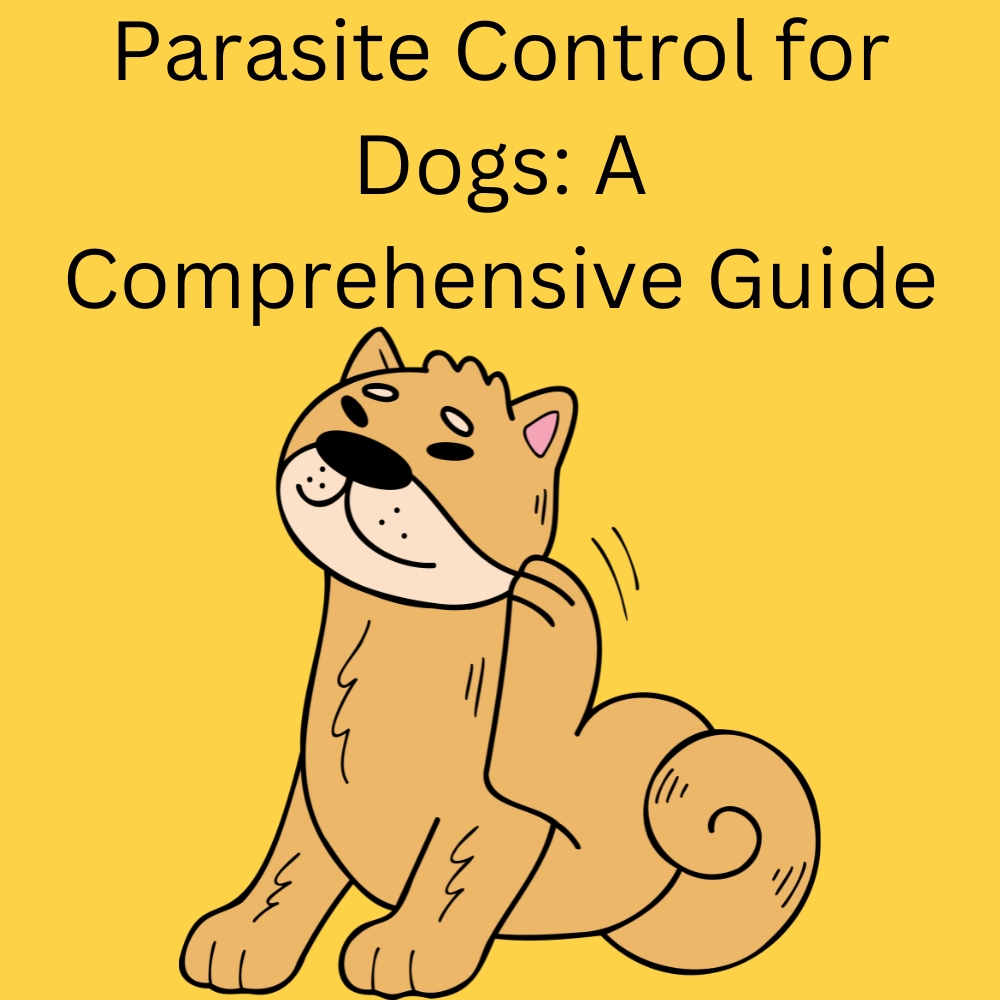Parasites pose a significant health risk to our beloved dogs. Understanding the importance of flea and parasite control is vital for every pet owner. This article provides a comprehensive guide on different types of parasites, prevention strategies, and best practices for parasite control in dogs.
Types of Parasites
There are various types of parasites that can affect your dog’s health. These include fleas, ticks, intestinal worms, heartworms, and external parasites such as mites.
Fleas
Fleas are tiny wingless insects that feed on the blood of mammals. They are one of the most common parasites found in dogs and can cause severe itching, irritation, and even skin infections. Fleas are not just a nuisance but can also transmit diseases to your dog.
To prevent flea infestations, it is essential to regularly groom your dog and keep their living area clean. Using flea preventatives such as topical treatments or oral medication can also help in controlling fleas.
Ticks
Ticks are small, blood-sucking parasites that attach themselves to a host and feed on their blood. They can transmit various diseases such as Lyme disease, Rocky Mountain spotted fever, and Ehrlichiosis.
To protect your dog from ticks, it is important to regularly check for them after outdoor activities and use tick preventatives such as collars or topical treatments. Keeping your dog’s living area clean and avoiding tall grass and wooded areas can also help in preventing tick infestations.
Intestinal Worms
Intestinal worms, also known as gastrointestinal parasites, are a common problem in dogs. They include roundworms, hookworms, whipworms, and tapeworms. These worms can cause digestive issues, weight loss, anemia, and even death in severe cases.
Preventing intestinal worms involves regular deworming medication, proper hygiene practices, and avoiding contact with contaminated soil or feces. It is also important to keep your dog away from infected animals.
Heartworms
Heartworms are a serious parasite that can be fatal if left untreated. These parasitic worms live in the heart and lungs of dogs, and their larvae are transmitted by mosquitoes. Heartworms can cause severe respiratory and cardiovascular issues.
Preventing heartworm involves using a monthly preventive medication prescribed by your veterinarian. It is also important to minimize your dog’s exposure to mosquitoes by keeping them indoors during peak mosquito activity times and removing standing water from your yard.
External Parasites
External parasites such as mites can cause skin irritation, hair loss, and even infections in dogs. These parasites are easily transmitted from other infected animals or through contact with contaminated objects.
To prevent external parasites, it is important to regularly groom your dog and keep their living area clean. If your dog shows signs of a parasitic infection, it is crucial to seek veterinary treatment immediately.
Best Practices for Parasite Control
Aside from specific prevention strategies, there are also general best practices that can help in controlling parasites in dogs.
- Regular Veterinary Visits: It is important to take your dog for regular check-ups and follow the recommended vaccination and parasite prevention schedules.
- Proper Hygiene: Keeping your dog clean and grooming them regularly can help in preventing external parasites. It is also important to properly dispose of your dog’s waste and keep their living area clean.
- Year-round Prevention: Parasites are not just a seasonal problem and can affect your dog at any time of the year. It is important to use preventive measures all year round.
- Consult Your Veterinarian: If you notice any signs or symptoms of a parasitic infection in your dog, consult your veterinarian immediately for proper diagnosis and treatment.
Parasite control is crucial for the health and well-being of our canine companions. By understanding the different types of parasites, their prevention strategies, and best practices for controlling them, we can ensure that our dogs live a healthy and happy life free from these harmful pests. Regular veterinary care and proper hygiene practices
Flea and Parasite Control for Dogs
Fleas are not just an itchy nuisance; they can carry various diseases harmful to dogs. Similarly, other parasites can cause severe health issues, emphasizing the importance of flea, tick, and parasite control for dogs. Prevention is always better than treatment when it comes to these pesky invaders. Here are some key points every pet owner should know about parasite control for dogs.
What is a Parasite?
A parasite is an organism that lives in or on another organism (host) and benefits by deriving nutrients at the host’s expense. They can be internal, like worms, or external, like fleas and ticks. Parasites can cause a range of health issues, from mild irritation to severe diseases and even death. Therefore, it is essential to take preventive measures to protect your dog from parasites.
Types of Parasites in Dogs
- Fleas: The most common external parasite found in dogs are small, wingless insects that feed on blood.
- Ticks: These arachnids latch onto the dog’s skin and feed on their blood, transmitting various diseases.
- Mosquitoes: These blood-feeding insects can transmit heartworm disease to dogs.
- Intestinal worms: Roundworms, hookworms, whipworms, and tapeworms are common intestinal parasites in dogs. They can cause digestive issues, anemia, and other health problems.
- Heartworms: These parasitic worms live in the heart and lungs of dogs and can be fatal if left untreated.
- Mites: These tiny external parasites can cause skin irritation and infections in dogs.
Prevention Strategies
- Regular grooming and clean living area: Grooming your dog regularly and keeping their living space clean can help prevent external parasites.
- Use flea and tick preventatives: Topical treatments, collars, and oral medications prescribed by your veterinarian can protect your dog from fleas and ticks.
- Proper disposal of waste: Contaminated feces are a common way for intestinal worms to spread. Properly disposing of your dog’s waste can prevent this.
- Avoiding high-risk areas: Ticks and mosquitoes are commonly found in tall grass and wooded areas, so it’s best to avoid them if possible.
- Year-round prevention: Parasites can be present at any time of the year, so it is crucial to use preventive measures all year round
Signs of Parasite Infestation
- Excessive scratching or licking
- Biting or chewing at the skin
- Visible fleas and ticks on the dog’s fur
- Red and inflamed skin
- Hair loss or hot spots
- Diarrhea or vomiting
- Weight loss or lack of appetite
Parasites can be a major threat to the health and well-being of our beloved dogs. However, by understanding the different types of parasites and implementing preventive measures, we can protect our furry friends from these harmful pests. Regular veterinary care, proper hygiene practices, and year-round prevention are key in keeping our dogs parasite-free. If you notice any signs or
Prevention Strategies for Parasite Control in Dogs
- Regular grooming: Brushing your dog’s fur helps to remove any parasites and spread natural oils that repel them.
- Use flea and tick preventatives: Monthly topical treatments or oral medications can prevent fleas, ticks, and heartworm disease.
- Keep your dog’s environment clean: Regularly vacuuming, washing bedding, and eliminating any standing water helps to reduce the presence of parasites.
- Avoid walking in areas with high parasite activity: Mosquitoes, fleas, and ticks can be found in grassy and wooded areas. Avoid these places to reduce the risk of infestation.
- Check your dog for parasites regularly: Regularly inspect your dog’s fur and skin for any signs of parasites. If you spot any, consult your veterinarian immediately.
Further information
Prevention is always better than treatment when it comes to parasites in dogs. By following these prevention strategies and staying vigilant, we can keep our canine companions safe and healthy. Remember, if you notice any signs of parasitic infection, seek veterinary treatment immediately for prompt diagnosis and treatment. Together, we can keep our dogs free from these pesky parasites.
So, it is crucial to use preventive measures all year round for the health and safety of our furry friends. Remember, regular veterinary care and proper hygiene practices are key in keeping our dogs parasite-free. By staying informed and taking necessary precautions, we can ensure that our dogs live a happy and healthy life free from harmful parasites. So let’s make parasite control for dogs a top priority to keep our furry friends safe and healthy. terinary treatment immediately for prompt diagnosis and treatment. Together, we can keep our dogs free from these pesky parasites. So, it is crucial to use preventive measures all year round for the health and safety of our furry friends. Remember, regular veterinary care and proper hygiene practices are key
The Importance of Parasite Prevention
Preventing parasites is crucial for your dog’s health. Regular veterinary check-ups, fecal exams, and the use of parasite prevention medications can significantly reduce the risk of infestation. Some parasites, like heartworms and ticks, can transmit deadly diseases to dogs. Prevention is much more cost-effective and less stressful for both the dog and owner than treatment.
By taking preventive measures, we can ensure our dogs live a happy and healthy life free from harmful parasites. So it is essential to prioritize parasite prevention for the well-being of our canine companions. Remember, with proper care and attention, we can keep our dogs safe and protected from pesky invaders. terinary care and proper hygiene practices are key in keeping our dogs parasite-free. By staying informed and taking necessary precautions, we can ensure that our dogs live a happy and healthy life free from harmful parasites. So let’s make parasite control for dogs a top priority to keep our furry friends safe and healthy.
Parasites are a common threat to the health of our canine companions, but with proper knowledge and preventive measures, we can keep them safe and healthy. Remember to regularly groom your dog, use flea and tick preventatives, keep their living space clean, avoid high-risk areas, and seek veterinary care if you notice any signs of infestation. Let’s work together to protect our dogs from harmful parasites and ensure they live a long and happy life by our side. So let’s make parasite prevention
External Parasites Commonly Seen On US Pets
External parasites like fleas and ticks are common in US pets. Understanding their life cycle and the risks they pose to dogs is important, especially in areas with high tick activity. Tick prevention is particularly vital for keeping your dog safe. Some common external parasites found in US pets include:
- Fleas: These tiny insects are reddish-brown and can easily infest your dog’s fur, causing excessive itching and skin irritation.
- Ticks: These small, blood-sucking arachnids can transmit serious diseases to dogs, such as Lyme disease and Rocky Mountain spotted fever.
- Mites: These microscopic parasites can cause skin irritation, itching, hair loss, and even mange in dogs.
- Lice: These small insects feed on the blood of dogs and can cause intense itching and skin damage.
- Mosquitoes: These flying insects can transmit heartworm disease to dogs through their bites.
Further
By understanding the risks associated with these common external parasites and taking preventive measures, we can keep our dogs safe and healthy. Consult your veterinarian for the best parasite prevention plan for your dog based on their lifestyle and risk factors in your area. Remember, with regular care and attention, we can protect our furry friends from harmful external parasites. So let’s stay informed and take necessary precautions to keep our dogs happy and healthy.
Internal Parasites Seen in US Dogs & Cats
Internal parasites, such as roundworms and tapeworms, can severely impact a dog’s health. Regular deworming and fecal testing can help identify and treat these parasites early. It is also essential to keep your dog’s environment clean and prevent them from ingesting feces or contaminated soil. Some common internal parasites seen in US dogs include:
- Roundworms: These spaghetti-like worms can grow up to several inches long and cause weight loss, diarrhea, vomiting, and other gastrointestinal issues.
- Hookworms: These small worms can attach themselves to the lining of a dog’s intestine and cause anemia, lethargy, and bloody diarrhea.
- Whipworms: These thread-like worms can cause diarrhea, weight loss, and anemia in dogs.
- Tapeworms: These segmented worms are usually transmitted by fleas and can cause digestive issues, anal itching, and even weight loss in dogs.
By regularly deworming your dog and maintaining good hygiene practices, we can prevent these internal parasites from causing
Best Parasite Control for Dogs
There are various options for parasite control in dogs, including monthly preventatives. Consulting with a veterinarian can help you choose the most effective treatment plan for your pet. Some options include:
- Topical treatments: These are applied directly to the dog’s skin and can protect against fleas, ticks, and heartworms.
- Oral medications: These are given orally and can also prevent multiple parasites.
- Collars: Flea and tick collars release active ingredients that repel pests.
Internal and External Parasite Treatment for Dogs
Treatment options for parasites include medications, topical treatments, and preventive measures. Each treatment option targets different types of parasites, emphasizing the importance of accurate diagnosis. Consulting with a veterinarian is essential for proper treatment and to avoid any potential side effects.
Parasite Prevention for Humans
Parasites can also pose risks to humans. Good hygiene and sanitation practices can help prevent parasite transmission from pets to humans. Regularly cleaning and disinfecting areas where pets spend time can also help reduce the risk of infestation. It is also essential to wash your hands after handling or playing with your dog.
Internal and External Parasite Treatment for Cats
Cats have specific parasite control needs, and like dogs, they benefit from monthly parasite prevention. Consult your veterinarian for the best parasite control strategy for your feline friends. Regular grooming and flea/tick control can also help keep parasites at bay.
The Role of Sanitation in Parasite Control
Proper sanitation can help prevent parasites. Regular cleaning of pet living areas and proper disposal of waste can significantly reduce the risk of parasite infestation. It is also essential to keep your yard free of standing water and debris where parasites can thrive.
Routine Diagnostic Tests for Dogs
Routine diagnostic tests, such as fecal exams and blood tests, are crucial for early detection and treatment of parasites. Regular check-ups with your vet can ensure that your dog remains parasite-free.
In conclusion, parasite control is an essential aspect of maintaining your dog’s overall health and well-being. By understanding the types of parasites, their risks, and prevention strategies, you can ensure that your furry friend leads a healthy, happy life.
FAQs
Q1: How do you control parasites in dogs?
Ans1: Parasites in dogs can be controlled through various methods such as regular grooming, using flea and tick preventatives, keeping their environment clean, avoiding areas with high parasite activity, and regularly checking for parasites.
Q2: What is the best anti parasite treatment for dogs?
Ans2: The best anti-parasite treatment for dogs depends on the specific type of parasite and its life cycle. Consulting with a veterinarian can help determine the most effective treatment plan for your dog.
Q3: What is the best parasite protection for dogs?
Ans3: Monthly topical treatments or oral medications are considered to be the best parasite protection for dogs, as they offer comprehensive coverage against multiple parasites.
Q4: How can I treat my dogs parasites at home?
Ans4: It is not recommended to treat a dog’s parasites at home without consulting with a veterinarian first. Over-the-counter medication may not be effective and could potentially harm your dog. A veterinarian can properly diagnose the type of parasite and prescribe appropriate treatment. Overall, prevention is key in controlling parasites in dogs and keeping them healthy. So, it is important to regularly consult with a veterinarian and follow their recommendations for parasite control to ensure the best possible protection for your furry friend.




